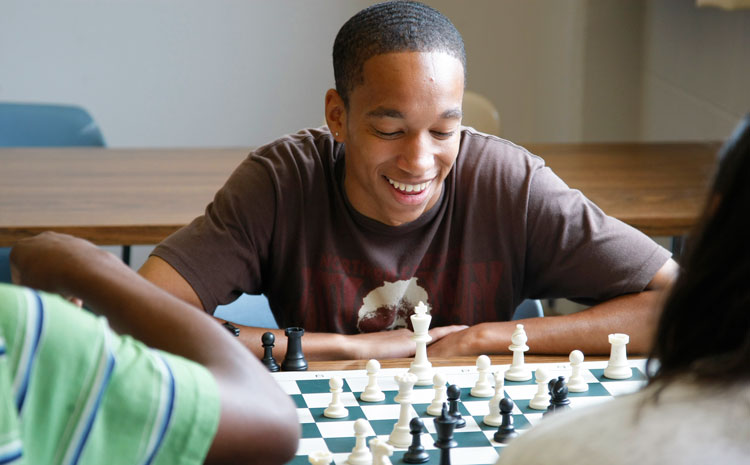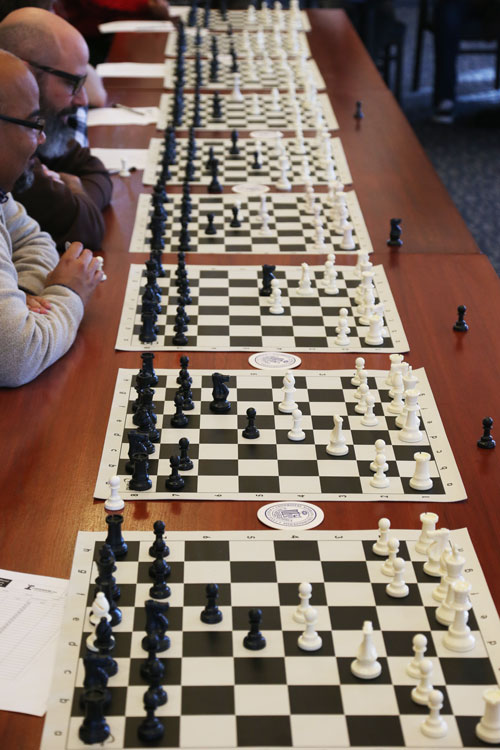
Students Take Deep Dive into Enduring Game of Chess
Mar 29, 2019
Simple to learn but impossible to truly master, chess is one of the most enduring, universal games in human history. And now, chess has come to Xavier in the form of a First-Year Seminar that features lectures and discussions, volunteer opportunities and spirited competition inside the classroom and beyond.
“You could play chess your entire life and not cover an edge of the realm of possibilities that the game affords, which helps to explain why it has endured for centuries,” says Adam Konopka, PhD, a visiting professor in the Department of Philosophy who developed the curriculum and began teaching the seminar in fall 2018.
“Students in this seminar are analyzing historical and contemporary variations of chess, interpreting chess symbolism in works of literature, researching the educational benefits of playing chess, and developing their game-playing proficiency.”
The innovative course is part of a unique community partnership with the Cris Collinsworth ProScan Fund Chess in Schools program, developed as an initiative of Penny and Steve Pomeranz. Penny is a member of Xavier’s Board of Trustees. Their mission is to empower children by fostering self-esteem, sportsmanship and critical thinking through chess. Six outdoor chessboards will also appear soon on Xavier's campus as a result of this partnership.
Chess in Schools has been placing trained chess instructors in local elementary, middle and high schools throughout Greater Cincinnati since 2013. Konopka, a Chess in Schools volunteer, takes students with him to a local elementary school at least once during the semester to observe and play the game. Interested students can sign up to become chess instructors with the program.
Sharing the love
Visiting the school was a highlight for Xavier freshman Isabella Langusch, who has been playing chess since second grade.
“Adam taught the third- and fourth-grade students about pawn promotion, and each of us played an opponent,” she says. “My opponent was about 10 years old, and he would just make the first move that popped into his head. It was fun to talk with him about being more strategic and anticipating the consequences of his decisions.”
Langusch says her appreciation for the game of chess grew exponentially as a result of the class.
“You go to college hoping to make the connection between knowledge and real life, and that’s exactly what this class did,” she says. “My final project was a paper about the neurological benefits of chess—the science proves that the more you play chess, the more you develop critical thinking, language and problem-solving skills, creativity, social skills and logic. The younger you start, the more you benefit. I think every kid should play chess!”
Creating a chess culture
Konopka’s seminar is open to novice and advanced players alike, and he devotes part of each class time to teaching strategies and tactics. Students play against one another, stop by during office hours to play Konopka himself, and play opponents online. In November and April, Xavier hosted “Simul Exhibitions” in which local chess master Russell Wilson played about 30 students at the same time.
This course and the Simul Exhibitions are laying a foundation for a growing “chess culture” at Xavier. Freshman Joshua Owen is completely on board—so to speak. Last fall, as part of his final project for the seminar, he began organizing a chess gathering that meets on Tuesday nights in the Gallagher Student Center.
“I was a casual player when I got to Xavier, but this class really deepened my understanding of the game’s history and certain strategies,” he says. “Now I’m playing a lot more—definitely online, but also with friends and with Adam. I really like that Xavier sees the value of chess and has made it more a part of campus life.”
Konopka, a lifelong chess player, is enthusiastic about the opportunity to share the wonder of chess with his students.
“The enjoyment of a well-played game arises from the discovery of a logical necessity amidst an open horizon of contingent possibilities,” he says. “The more you play chess, the more you realize what an elegant and endlessly fascinating game it is.”
Feature Image: One of many students practicing their chess skills during the first Simul Exhibition.